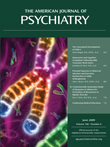Prenatal Exposure to Maternal Infection and Executive Dysfunction in Adult Schizophrenia
Abstract
Objective: Executive dysfunction is one of the most prominent and functionally important cognitive deficits in schizophrenia. Although strong associations have been identified between executive impairments and structural and functional prefrontal cortical deficits, the etiological factors that contribute to disruption of this important cognitive domain remain unclear. Increasing evidence suggests that schizophrenia has a neurodevelopmental etiology, and several prenatal infections have been associated with risk of this disorder. The authors examined whether prenatal infection is associated with executive dysfunction in patients with schizophrenia. Method: The authors assessed the relationship between serologically documented prenatal exposure to influenza and toxoplasmosis and performance on the Wisconsin Card Sorting Test and the Trail Making Test, part B (Trails B), as well as other measures of executive function, in 26 patients with schizophrenia from a large and well-characterized birth cohort. Results: Patients who were exposed to infection in utero committed significantly more total errors on the Wisconsin Card Sorting Test and took significantly more time to complete the Trails B than unexposed patients. Exposed patients also exhibited deficits on figural fluency, letter-number sequencing, and backward digit span. Conclusions: Prenatal infections previously associated with schizophrenia are related to impaired performance on the Wisconsin Card Sorting Test and Trails B. The pattern of results suggests that cognitive set-shifting ability may be particularly vulnerable to this gestational exposure. Further work is needed to elucidate the specificity of prenatal infection to these executive function measures and to examine correlates with neuroanatomic and neurophysiologic anomalies.



